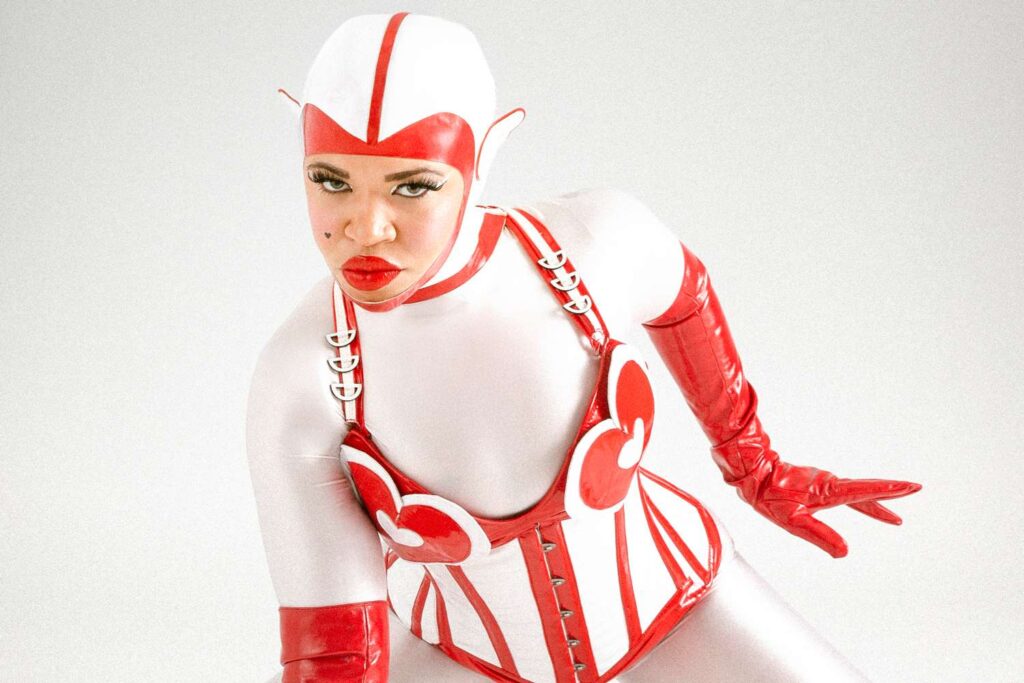NEED TO KNOW
Madison Rose is paving her own path.
Since choosing a career in pop music a decade ago, the rising artist has performed at venues big and small throughout New York City and beyond, opened for the likes of Aqua and released two albums completely independently of the major record label system. Between navigating the cutthroat business world, mental health and more on her own, it hasn’t exactly been an easy ride.
“I had to decide that I wasn’t going to wait for anybody to give me a yes, because I just learned really quickly, and frankly, the hard way, that the industry was not going to give me the yes I wanted,” Rose, 29, whose second full-length body of work, MONOCHROME: The White Album, is out now, tells PEOPLE.
The 21-track project of high-energy dance bangers like “Panavision” and “She’s the One” comes after 10 years of working in music professionally and a lifetime of artistic passion. Born in Cincinnati to a “dog trainer and maintenance man” father and construction worker mother, Rose earned the nickname “little alien” in her family at a young age for her unexpected creativity.
Around 9 years old, she began working with a local modeling agent with dreams of becoming a Disney Channel star. Her parents separated around the same time, a couple years before she successfully convinced her mom to move them to Los Angeles at age 11. After a few years of trying to make it in Hollywood and writing poetry on the side, she took a songwriting course, received encouragement from the teacher and realized music was her calling.
Chelsea Guglielmino/Getty
“I didn’t grow up with resources in a financial way. All of my musical knowledge is by ear. I studied pop music,” explains Rose, whose longtime inspirations include Lady Gaga, Robyn, Beyoncé, Donna Summer and Whitney Houston. “I’m not a secret nepo baby. I’ve been hustling since I was a single digit.”
Rose’s official start in the music business came with a backup singing gig at age 19, and she first released music of her own in 2018. But it wasn’t until realizing her queer identity in the pandemic that her artistry blossomed into what it is today. “I could not be the fully realized person that I am now without stepping into my queerness. And I don’t think anybody can,” she says.
Her debut album, TECHNICOLOR, was released in May 2022, shortly before she moved to N.Y.C. “Something I learned on TECHNICOLOR was just trusting my own gut and not getting swept up in others’ opinions,” says the musician, who weathered bait-and-switch moments with executives who seemingly wanted to sign her — but change her direction to fit their ideas. “I would always fight and get back, but it felt like it took such a long road to get back to what I wanted.”
Releasing TECHNICOLOR and relocating across the country led Rose to an incredible slate of new opportunities, from opening for Aqua at a 1,000-capacity venue to weekly performances at the hottest parties and bars in the city. “I got stopped on the street by my house today, and it’s been such a joy to just get deeper into this community that really has supported me tooth and nail pretty much since I touched down here,” she says.
While simultaneously performing full-time over the past two-and-a-half years, Rose created MONOCHROME: The White Album, and the creative process involved heavily exploring her experience with bipolar disorder. “I switch back and forth all the time in my thinking because I am this bright, colorful, creative artist, but I am living with a mental illness that actually can make me very rigid in the way that I think,” she says.
The title, a clear sequel to TECHNICOLOR, represents how her brain often feels as though it functions in black and white — but in order to succeed, she must find the color in the middle and bask in the nuances of life. “MONOCHROME: The White Album is a semi-autobiographical story about my journey from moving from L.A. to New York and how that was the most confusing, depressive moment of my life, but was a tool for self-discovery,” she explains.
Jennifer Trahan/@jen_trahan
The album’s narrative is told through two robot characters: Supersonic, who represents the depressive side of her brain and how it’s often used for protection, and Slaybot, who controls the manic side.
“It’s an album about self-discovery and transmuting these things that people say are your weak points into your strong points,” says Rose, who sees her identity as a queer, Black woman living with mental illness as a superpower. “And, yes, because there is The White Album, there will inherently be The Black Album.”
Jennifer Trahan/@jen_trahan
In the week’s leading up to releasing MONOCHROME: The White Album, Rose extended her vulnerability to social media, where she’s gotten candid about the plights of working as a fully independent artists. She’s been open about the mental and financial tolls it’s taken on her life, from having record deals dangled in her face to simply being told she’s not good enough by powerful industry figures.
“I’m not going to participate in the victim mentality the music industry tries to inflict on people, that you’re just supposed to take it and not say anything,” says Rose. “It doesn’t mean I don’t have a thick skin. I have a very thick skin. I’m very strong. But I’m not going to suffer in silence when it was someone else’s wrongdoing.”
In sharing her own experiences, she hopes to help other independent acts realize they can make it on their own — not that it’ll be easy, but that it’s possible. “I feel like independent artists are forced into this place right now where [major record labels] are like, ‘We want you to do everything and develop, and develop, and develop, and develop, and basically get yourself to the point where you don’t need us, but then we’re going to convince you that you do,'” she says.
Rose is open to signing with a larger company down the line, but she refuses to compromise in order to do so and hopes other artists won’t have to either. “I want to retain ownership of everything. I want to come out of the gate, I own everything, I make every decision. Essentially, it’s just a really great distribution deal. That’s basically what I’m looking for of a major,” she says. “I say it at the end of ‘Red Lipstick,’ like, ‘When I come to claim the deed, I’m signing that contract with a red lipstick,’ period. Because I’m like, ‘No, bitch. I’m here. And I did it the way I want.'”
Part of her determination comes from learning firsthand that she can find success on her own. Following a lifetime of living stateside, she recently headlined a show overseas. “Talk about a pinch-me moment, being able to go to London, a place I’d never been, and be in a room full of people screaming my songs,” says Rose. “I have the most dedicated, kind, loving fans, and they really do keep me going.”
She also has the unwavering confidence to make it happen. “In five years from now, I have already sold out [Madison Square Garden] and headlined Coachella. I think, in five years, I’ll finally be pivoting back into acting, which is really what I want. But I’ve got to tour the world first,” she predicts. “I’ll probably be in full empire build by then. There’ll be Madison Rose cosmetics, a fashion line and all that.”

